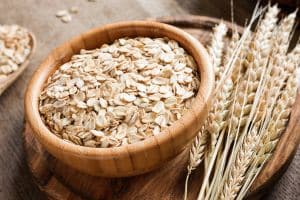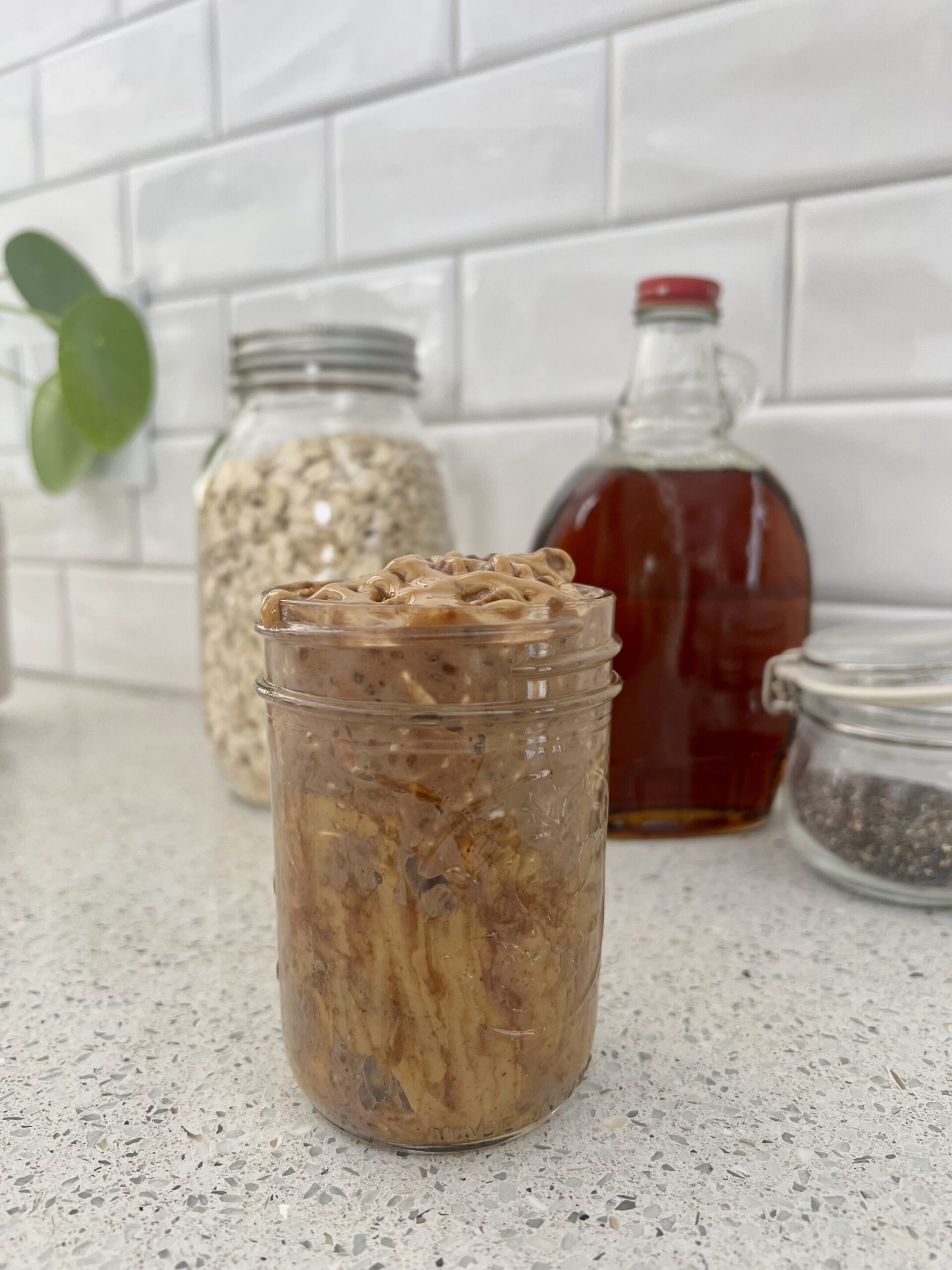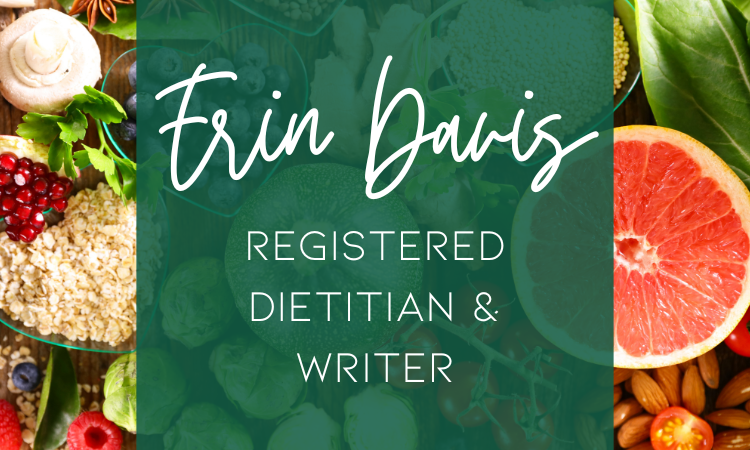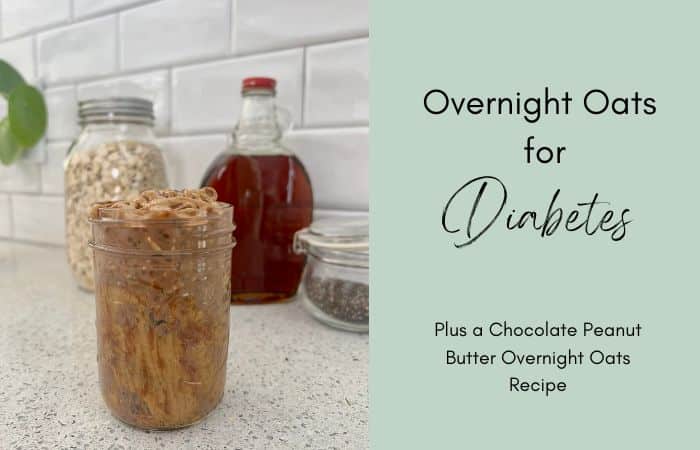Overnight oats for diabetes are a quick, easy, and delicious way to prepare a nutritious breakfast. With diabetes, it is important to balance blood sugar levels throughout the day and overnight oats are a great start. The endless combination of possibilities keeps this meal option exciting and nourishing.
Have you been told to avoid carbs to improve your insulin resistance? As a diabetes educator who specializes in intuitive eating, I see a lot of people who have been given this advice.
But if you’re giving up carbs, you are missing out on an opportunity to fuel your body with nutrient-dense foods.
Carbs like oats are great for people with diabetes and can be packed full of vitamins, minerals, antioxidants, fiber, and other things your body needs to thrive.
Why are overnight oats so great for diabetes? The answer lies in the many benefits of the recipe’s ingredients.
In this post, we’re discovering the benefits of overnight oats for diabetes. Plus, you’ll find a delicious recipe so you can try overnight oats today.
Why Eat Overnight Oats?
We will explore the many health benefits associated with oats below, but there are several other reasons to try this meal.
Overnight oats are a quick and convenient way to meal prep. Overnight oats can be made in about five minutes and hardly require any cleanup. You can mix up all of the ingredients in the same dish you store them in.
Overnight oats are also perfect for any meal throughout the day. They are a delicious option for breakfast, or a quick-grab meal for lunch on-the-go. You can pack along oats and eat them cold or warmed in the middle of the day for a filling lunch.
Below we will also discuss the variability of overnight oats. You can be creative as you please with this meal, combining flavors to switch it up day to day.
Benefits of Oats

Let’s begin with its star ingredient—oats. This meal is a great source of carbs since oats have a low glycemic index. This means they cause a slow, controlled increase in blood sugar levels rather than spikes.
Specifically, steel-cut or large flake oats have the lowest glycemic index. This is especially beneficial for those with diabetes due to a reduced risk of blood sugar spikes.
Including overnight oats in your diet also supports the idea of carbohydrate quality over quantity concerns. Oats are also high in protein, fiber, vitamins, and antioxidants.
In addition to helping with diabetes, studies show that oats can also help with other conditions such as heart disease, inflammation, some cancers, obesity, and improvements in immunity and gut health.
By improving gut health, you may see an improvement in overall health and lower the risk of chronic diseases like obesity, type 2 diabetes, and cancer. What’s not to love about oats?
Benefits of Chia Seeds

Another common ingredient in overnight oats is chia seeds. These small seeds contain tons of fiber which also has numerous health benefits. Fiber aids in blood sugar control, heart health, and cholesterol.
Fiber is beneficial for prediabetes, type 1 and 2 diabetes, and gestational diabetes as it can help prevent further complications from diabetes or other health conditions.
Oats and chia seeds both promote feelings of fullness, so it is a hearty dish that will leave you satisfied without causing your blood sugar to run rampant.
Liquid
When choosing a liquid to mix in overnight oats, milk is a standard choice. To make it more diabetes friendly, alternative milk options can be used such as unsweetened almond milk, soy milk, or coconut milk.
These liquid options have a slightly lower carb content than regular cow’s milk, and are also beneficial for dairy sensitivities. The following list breaks down the carb content in a one-cup serving size of each milk option:
- Unsweetened Almond Milk contains 0.8 g of carbs
- Unsweetened Coconut Milk contains 1 g of carbs
- Unsweetened Soy Milk contains 2 g of carbs
- Whole milk contains 11.7 g of carbs
- 2% Reduced Fat Milk contains 12 g of carbs
- Skim milk contains 12 g of carbs
An important thing to note is that these servings of milk will vary depending on your overnight oats recipe.
Protein
The addition of Greek yogurt to your oats can also the protein content. Alternatively, you could spoon some overnight oats over a serving of Greek yogurt for a parfait.
Other protein add-ins for overnight oats include nut butters such as peanut butter, almond butter, or a mixed nut butter. Protein powders are also a simple addition to your oats to boost protein content.
Diabetes-Friendly Ways to Sweeten Your Overnight Oats

Maybe you prefer your overnight oats sweet. Using natural or alternative sweeteners such as maple syrup, honey, monk fruit sweetener, or stevia also makes overnight oats blood sugar friendly.
The following list contains a breakdown of diabetes-friendly sweeteners and their carb amounts:
- 1 Tablespoon of Maple Syrup contains 14 g of carbs
- 1 Tablespoon of Honey contains 17 g of carbs
- 2 Teaspoons of Monk Fruit Sweetener contains less than 1 g of carbs
- 1 Teaspoon of Stevia powder contains less than 1 g of carbs
These natural or alternative sweeteners do not have as profound of an effect on blood sugar unlike processed or refined sugar. All of these sweeteners can be adjusted for personal preference of sweetness of overnight oats.
Nutrient-Rich Mix-Ins
Some potential toppings or mix-ins include fruits such as apples, strawberries, or peaches which are also high in fiber and have a low glycemic index.
Here are some other options that will enhance the nutritional value and flavor profile of overnight oats by providing your body with antioxidants:
- Nuts such as almonds or pecans
- Seeds such as flaxseeds or hemp seeds
- Berries such as raspberries, blueberries, or blackberries
- Spices such as cinnamon or turmeric
- Some dried fruits such as cherries or dates (bonus: dates are another way to sweeten oats!)
Oats for Gestational Diabetes

Studies show that blood sugar levels for those with gestational diabetes can vary a lot in the morning. Because of this, it might be beneficial to eat carbs in the morning, while other times it can spike sugar levels in gestational diabetes.
Eating overnight oats later in the day is one way to combat these issues. With their flexibility, the oats make for a great lunch, dinner, or even snack option.
Another way to lower blood sugar is to eat protein. You can get some ideas for high-protein overnight oats above.
Here are some swaps for high-protein and lower-carb overnight oats that can be eaten in the morning.
- Swap cow’s milk for almond or coconut milk
- Try monk fruit sweetener to sweeten oats
- Decreasing the amount of oats consumed is another way to combat a high carb intake. Instead, try halving the overnight oats recipe and eating them over yogurt or with other high-protein breakfast options (eggs, cottage cheese, or a protein-packed smoothie)
Recipe for Overnight Oats
Below, there is a recipe for chocolate peanut butter overnight oats that is rich and protein-packed, but there are so many other opportunities for flavor in overnight oats.
Chocolate Peanut Butter Overnight Oats

Ingredients
- ½ cup oats
- 1 Tbsp chia seeds
- 1 Tbsp unsweetened cocoa powder
- 2 Tbsp peanut butter
- 1 Tbsp pure maple syrup
- ½ cup milk of choice
- Airtight jar or container
Instructions
- Combine the oats, chia seeds, and unsweetened cocoa powder in an airtight jar or container. Then add milk of choice, peanut butter, maple syrup, and stir well.
- Put the container in the fridge overnight or for at least 2 hours and enjoy cold or warmed!
- Adjusting the amount of milk can change the consistency of the oats. If they appear too thick upon eating, add more milk.
Notes
- Overnight oats can be stored in the fridge for up to 5 days.
- All of the dry ingredients can be prepared ahead of time. Just add the milk, peanut butter, and syrup before placing it in the fridge.
Nutrition Information:
Yield:
1Amount Per Serving: Calories: 501Total Fat: 22gSodium: 194mgCarbohydrates: 50gProtein: 20g
Nutrition facts are estimated and may not be exact.
Key Points
- The flexibility of building this dish is one of the many exciting things about overnight oats and prevents flavor burnout and increases the variety of nutritious options in this hearty breakfast.
- Overnight oats are a great meal option for those with diabetes as they contain such nutritious ingredients and promote ease in meal planning for a quick and filling breakfast.
- The ingredients in overnight oats can be adjusted for different carb needs, or eaten at different times of the day for gestational diabetes.
References
- Paudel D, Dhungana B, Caffe M, Krishnan P. A review of health-beneficial properties of oats. Foods. 2021;10(11):2591. Published 2021 Oct 26. doi:10.3390/foods10112591
- Sievenpiper JL. Low-carbohydrate diets and cardiometabolic health: the importance of carbohydrate quality over quantity. Nutr Rev. 2020;78(Suppl 1):69-77. doi:10.1093/nutrit/nuz082
- Reynolds AN, Akerman AP, Mann J. Dietary fibre and whole grains in diabetes management: Systematic review and meta-analyses. PLoS Med. 2020;17(3):e1003053. Published 2020 Mar 6. doi:10.1371/journal.pmed.1003053
- Dingena CF, Holmes MJ, Campbell MD, Cade JE, Scott EM, Zulyniak MA. Observational assessments of the relationship of dietary and pharmacological treatment on continuous measures of dysglycemia over 24 hours in women with gestational diabetes. Front Endocrinol (Lausanne). 2023;14:1065985. January 26, 2023. doi:10.3389/fendo.2023.1065985
- Rasmussen L, Christensen ML, Poulsen CW, et al. Effect of high versus low carbohydrate intake in the morning on glycemic variability and glycemic control measured by continuous blood glucose monitoring in women with gestational diabetes mellitus-A randomized crossover study. Nutrients. 2020;12(2):475. February 13, 2020. doi:10.3390/nu12020475
About the author
Morgan is a Clinical Dietetics and Applied Food and Nutrition major at Grand Valley State University. She loves learning how to keep nutritious food fun. Her interests currently lie in functional nutrition counseling, but she is excited to see where the rest of her education will lead her. In her spare time, she enjoys traveling, spending time with friends and family, cooking, and being outdoors. She looks forward to becoming a registered dietitian and helping others form positive relationships with food.


